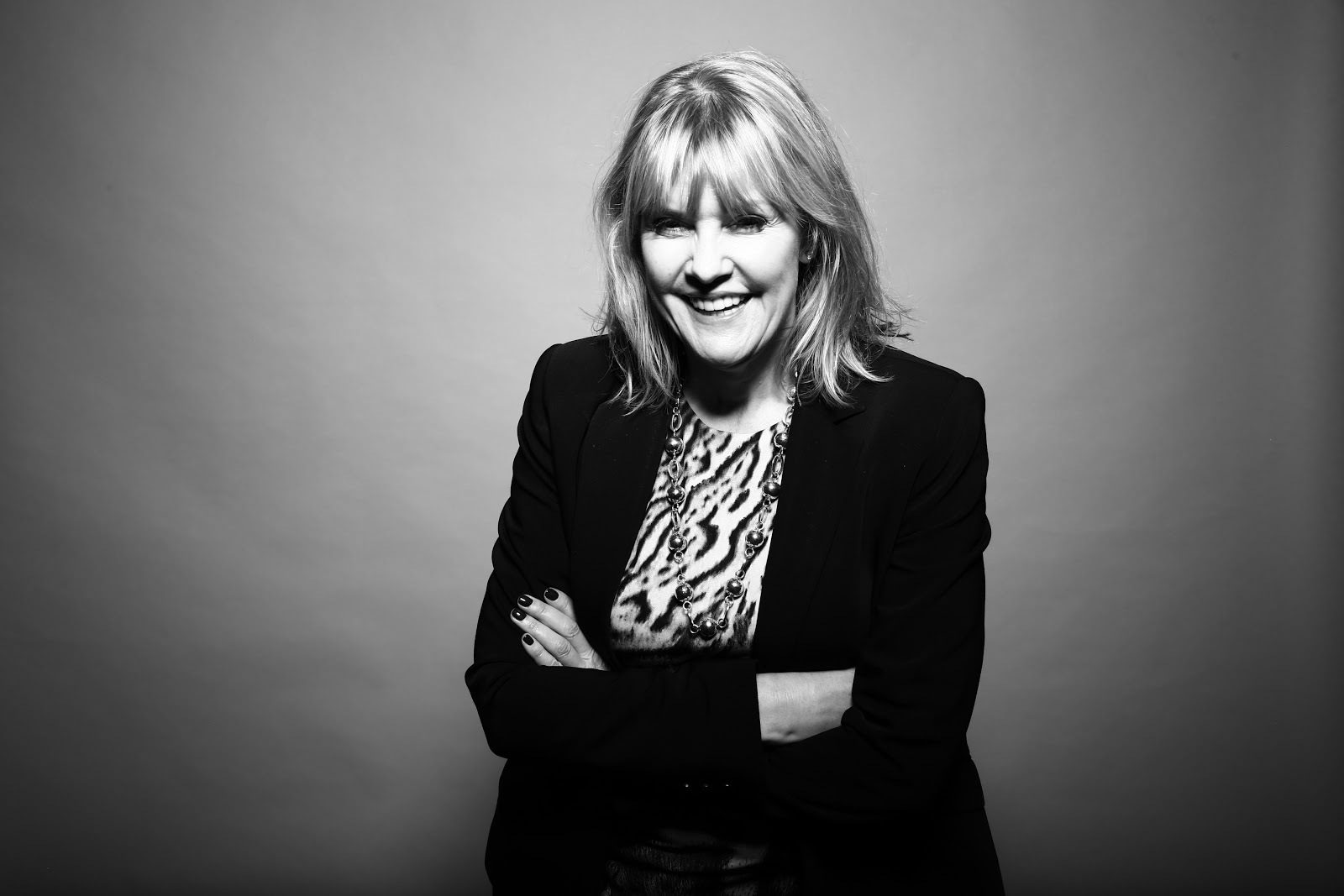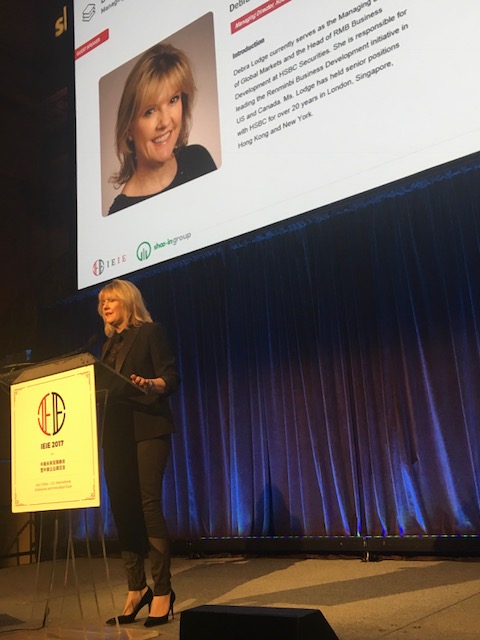Q&A with Debra Lodge, a major force behind RMB internationalization
Q&A with Debra Lodge, a major force behind RMB internationalization

China has been pushing the internationalization of its currency for years. Debra Lodge, managing director for HSBC Global Markets, has been heading up her bank’s Renminbi Business Development in North America. With over 25 years of experience in the global financial market, Lodge has helped clients understand China’s economy, regulatory changes, and their impact on business, and provided advice about onshore and offshore investment products.
Before our second annual Women’s Conference: How Women Are Shaping the Rising Global Power, Lodge explained to The China Project how the country’s gradual reform in financial sectors can benefit foreign enterprises and why the yuan business in the U.S. has been growing exponentially.
The China Project: You are an experienced banker, having worked for notable firms such as HSBC and Goldman Sachs. In retrospect, can you give us some examples of your business that you consider a huge success?
Lodge: I have been very fortunate that my 30 years in banking have exposed me to a number of diverse roles, starting with equity operations for Goldman Sachs in London to now being HSBC’s China expert for the Americas! Along the way, there have been many successes and, of course, at times failures, but those failures have all been wonderful learning opportunities (although, at the time, perhaps I did not see it that way!).
I believe that at all stages of your career, you should take pride in your work and share the successes you have with your team. As an example, I was the first non-qualified accountant to join HSBC’s internal Treasury audit team. My management at the time took a risk; it was totally alien to offer an unqualified candidate such an important role. Our team approach educated me about balance sheets and best audit practices, and in return, my colleagues were far more informed around operational processing and inherent risk. My time in Latin America was also in many ways groundbreaking. I was tasked with implementing an eFX strategy across 12 countries, including managing the technology teams and regulators and building an on-the-ground e-sales force. This fundamental reengineering of what was, at the time, a mature, male-dominated business with deep-rooted processes helped pave the way for HSBC’s current digital strategy.
My role now is very much client facing. China is a diverse and, at times, a challenging environment for businesses to operate in. Client feedback regularly highlights to me what a great success the New York–based China solutions team is. We live in an age whereby everyone wants information now, not 12 hours later. Gone are the days where clients are happy to wait for the opening of the Asia market to get answers; their impatience inspires us to deliver a better product and service.

The China Project: For the Chinese government, controlling financial risk has been a top priority in the past few years, given the rise of shadow banking and other alternative financial practices. What do you see as the most dangerous financial threats and concerns that China is facing today?
Lodge: China has made visible progress in reforming its financial sector in the last few years, and we are encouraged by the vigorous efforts of the Chinese leadership in tackling shadow banking. China has the tool kit and the ability to reduce debt, resolve overcapacity, and tackle business challenges with market solutions. For example, the new municipal bond markets and their ability to help local governments refinance their legacy debt. China’s progress since the game-changing 19th Party Congress held in November 2017 is also very encouraging. Financial stability was highlighted as a priority and following the NPC in March 2018, policies have been introduced to slow the rise in excessive risk taking and corporate leverage.
The China Project: According to a report by HSBC, “China’s efforts to expand the international use of the renminbi have stalled in the past two years,” and at the start of 2018, “the renminbi’s share of global payments had dropped to 1.61 percent.” Can you share what caused the stagnation and how soon the momentum of renminbi internationalization will resume?
Lodge: The year 2018 will be remembered in part as the year when RMB internationalization was placed firmly back on the agenda. It is front and center of China’s “going-out” strategy of which the Belt and Road Initiative is key. Our RMB business in the U.S. has been growing exponentially, and that’s because our clients are realizing more and more the benefits of transacting in local currency rather than the USD when doing business with China. China’s path toward reform will always be gradual, including FX reform. Corporates will find at times that the sailing isn’t always smooth, but the ocean of opportunities available in China, especially when adopting the local currency, are rapidly increasing.

The China Project: What’s your view on the future of Chinese investment in the U.S.? How do you assess the impact of China’s 2017 tightening on capital outflows?
Lodge: The U.S.-China economic relationship is the most important bilateral relationship in the world to get right, and the two sides have made great strides of late in working through long-standing disputes to access each other’s markets. The year 2017 was a challenging year for both Americas- and China-based clients as the PBOC and SAFE looked to stabilize and validate capital outflows. China has, however, demonstrated a deep commitment to reform, and will continue to do so in its characteristic gradual manner. Our dialogue with Chinese clients that wish to invest in the U.S. remains robust, and we are bullish on our pipeline and that of Chinese investment into the U.S. at large.
The China Project: Do you think women in finance are underrepresented in senior positions within financial firms? What are some struggles you went through as a female leader? Can you share some advice with women who aspire to be as accomplished as you?
Lodge: It has to be acknowledged that during my time in finance, the industry has come a long way. However, it still has a long way to go. The U.K. gender pay gap statistics published this year (which are more about the underrepresentation of women at senior levels rather than pay scales) add further credibility to my comment. One particular struggle of mine that I remember was when I worked in Latin America, I would often be the only female present at senior-level meetings and client gatherings. It took time and perseverance to be taken seriously and considered part of the team. However, once that happened, I can honestly say those years were some of the happiest in my career.
The best advice I can give is always be yourself, trust your instincts, have confidence in your abilities, and always deliver what you agree to deliver, whether it be to your manager, peers, or clients. Be mobile, be willing to consider roles outside of your home country and comfort zone; you cannot put a price on cultural awareness and appreciation. How often have we looked at a job description and not applied for a role because we were not the “perfect fit,” only to find out the successful candidate was not a perfect fit, either! Once you start to climb the career ladder, be a role model for those beneath and around you, be generous with your time and expertise. Finally, be strict with yourself about a work/life balance. In the words of First Lady Barbara Bush, “At the end of your life, you will never regret not having passed one more test, not winning one more verdict, or not closing one more deal. You will regret time not spent with a husband, a child, a friend, or a parent.”
Catch Debra Lodge on Monday, May 14, at the Harvard Club of New York during the second annual The China Project Women’s Conference.






